The recent discussions by Federal Reserve (Fed) Chairman Jerome Powell and European Central Bank (ECB) President Christine Lagarde shed light on the current monetary policy outlook. Powell emphasized the stickiness of services inflation, indicating a potential challenge for policymakers. He also mentioned that wage increases are moderating towards sustainable levels, but still remain above equilibrium. Lagarde pointed out that the labor market is cooling off and that inflation may reach 2% in the near future.
The Federal Reserve (Fed) plays a crucial role in shaping monetary policy in the United States. With dual mandates of achieving price stability and fostering full employment, the Fed primarily adjusts interest rates to achieve these objectives. When inflation exceeds the 2% target, the Fed raises interest rates to curb excess price growth. Conversely, when inflation is below target or unemployment is high, the Fed may lower interest rates to stimulate borrowing and economic activity.
The Federal Reserve conducts eight policy meetings per year, where the Federal Open Market Committee (FOMC) evaluates economic conditions and makes decisions on monetary policy. The FOMC comprises twelve officials, including members of the Board of Governors and regional Reserve Bank presidents. In times of crisis or prolonged low inflation, the Fed may resort to Quantitative Easing (QE) as a non-standard policy measure. QE involves increasing the flow of credit by purchasing bonds from financial institutions, leading to a weaker US Dollar.
Quantitative Easing (QE) was notably used by the Fed during the Great Financial Crisis in 2008 to address the stagnant financial system. By printing more Dollars and buying bonds, the Fed aims to boost economic activity. On the other hand, Quantitative Tightening (QT) is the process of reducing the Fed’s bond holdings, which can strengthen the US Dollar. QT involves the Fed refraining from reinvesting the principal from maturing bonds and not purchasing new bonds.
The discussions between Powell and Lagarde highlight the challenges and considerations in monetary policy. The Federal Reserve’s role in shaping US economic outcomes through interest rate adjustments and non-standard policy measures like QE and QT are crucial for maintaining stability and promoting growth. As global economic conditions evolve, it is essential for central banks to remain vigilant and adaptable in their policy approaches.

